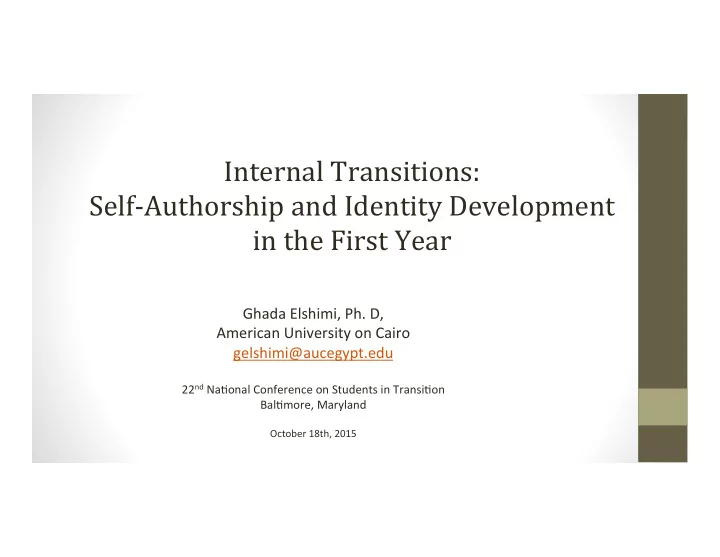

Internal ¡Transitions: ¡ Self-‑Authorship ¡and ¡Identity ¡Development ¡ in ¡the ¡First ¡Year ¡ ¡ Ghada ¡Elshimi, ¡Ph. ¡D, ¡ American ¡University ¡on ¡Cairo ¡ gelshimi@aucegypt.edu ¡ ¡ 22 nd ¡Na@onal ¡Conference ¡on ¡Students ¡in ¡Transi@on ¡ Bal@more, ¡Maryland ¡ ¡ October ¡18th, ¡2015 ¡
Research ¡Questions ¡ • How ¡do ¡first ¡year ¡students ¡in ¡an ¡interna@onal ¡liberal ¡arts ¡university ¡ experience ¡self-‑authorship ¡(located ¡in ¡Egypt)? ¡ ¡ • What ¡curricular ¡experiences ¡in ¡the ¡first-‑year ¡program ¡foster ¡self-‑ authorship ¡development ¡as ¡iden@fied ¡by ¡this ¡popula@on ¡of ¡students? ¡ ¡ • What ¡implica@ons ¡can ¡be ¡made ¡about ¡programming ¡and ¡ac@vi@es ¡that ¡ enhance ¡the ¡development ¡of ¡self-‑authorship ¡in ¡first-‑year ¡university ¡ students? ¡ ¡ ¡
Rationale ¡ Self-‑authorship ¡is ¡inherent ¡in ¡the ¡goals ¡of ¡higher ¡educa@on: ¡ ¡ • Mission ¡statements ¡of ¡21 st ¡Century ¡ins@tu@ons ¡emphasize ¡skills ¡of ¡ ¡analysis, ¡problem ¡solving, ¡ evalua@on, ¡cri@cal ¡thinking ¡and ¡social ¡integra@on ¡(Chan, ¡Brown ¡and ¡Ludlow, ¡2014; ¡Baxter ¡ Magolda ¡and ¡King, ¡2007; ¡Council ¡for ¡the ¡Advancement ¡of ¡Standards ¡in ¡Higher ¡Educa@on, ¡2011). ¡ ¡ These ¡skills ¡characterize ¡ self-‑authored ¡ individuals. ¡ ¡ • Understanding ¡self-‑authorship ¡allows ¡educators ¡to ¡create ¡transforma@ve ¡learning ¡experiences ¡ that ¡enable ¡students ¡to ¡make-‑meaning ¡from ¡their ¡environment ¡to ¡build ¡modes ¡of ¡thinking ¡that ¡ impact ¡their ¡behavior ¡and ¡values. ¡ • First ¡year ¡is ¡a ¡transi@on ¡– ¡educators ¡must ¡inten@onally ¡capitalize ¡on ¡momentum ¡of ¡transi@on ¡to ¡ build ¡iden@ty. ¡ ¡Years ¡18-‑25 ¡are ¡founda@onal ¡in ¡cogni@ve ¡and ¡personal ¡growth: ¡they ¡are ¡spent ¡in ¡ classrooms. ¡ ¡We ¡must ¡understand ¡and ¡op@mize ¡these ¡years. ¡ • Higher ¡educa@on ¡o`en ¡provides ¡ ¡formulas ¡for ¡success ¡(Baxter ¡Magolda, ¡2001), ¡rather ¡than ¡ capaci@es ¡to ¡author ¡ac@on ¡and ¡ideas. ¡ ¡This ¡is ¡problema@c: ¡in ¡real-‑world ¡contexts, ¡problems ¡are ¡ not ¡pre-‑scripted, ¡cannot ¡be ¡addressed ¡using ¡a ¡set ¡of ¡learned ¡formulas. ¡There ¡is ¡a ¡need ¡for ¡ enabling ¡self-‑authorship ¡in ¡higher ¡educa@on. ¡ ¡ ¡
Purpose ¡ • To ¡contribute ¡to ¡ ¡self-‑authorship ¡and ¡student ¡development ¡theory ¡ ¡ • To ¡inves@gate ¡self-‑authorship ¡processes ¡of ¡ethnically ¡diverse ¡students ¡ ¡ • To ¡understand ¡the ¡curricular ¡experiences ¡in ¡the ¡first ¡year ¡program ¡that ¡ students ¡viewed ¡as ¡relevant ¡in ¡enhancing ¡self-‑authorship ¡development ¡ ¡ • To ¡recommend ¡interven@ons ¡in ¡first-‑year ¡programming ¡that ¡can ¡enhance ¡ self-‑authorship ¡ ¡
Problem ¡ • Higher ¡educa@on ¡o`en ¡focuses ¡on ¡academic/cogni@ve ¡development ¡of ¡ students ¡(Baxter ¡Magolda, ¡2001), ¡leading ¡to ¡compartmentaliza@on ¡of ¡ academic ¡and ¡student ¡affairs ¡(Bloland, ¡Stamatakos ¡and ¡Rogers, ¡1996). ¡ ¡ Need ¡for ¡integra@on. ¡ ¡ • Need ¡for ¡further ¡research ¡on ¡educa@onal ¡environments ¡that ¡enable ¡self-‑ authorship ¡(Baxter ¡Magolda ¡and ¡King, ¡2004, ¡Pizzolato, ¡2007, ¡Hoefer, ¡2008) ¡ ¡ ¡ • Need ¡for ¡research ¡on ¡impact ¡of ¡curricular ¡events ¡on ¡first-‑year, ¡which ¡is ¡ cri@cal ¡in ¡reten@on, ¡engagement ¡and ¡success ¡(Barefoot ¡et ¡al., ¡1998; ¡ Upcra` ¡et ¡al., ¡2005, ¡Barton ¡and ¡Donahue, ¡2009) ¡ ¡
What ¡is ¡Self-‑Authorship? ¡ Self-‑authorship ¡is ¡ “simultaneously ¡an ¡ability ¡to ¡construct ¡knowledge ¡in ¡a ¡contextual ¡world, ¡an ¡ ability ¡to ¡construct ¡an ¡internal ¡iden7ty ¡separate ¡from ¡external ¡influence, ¡and ¡an ¡ability ¡to ¡engage ¡ in ¡rela7onships ¡without ¡losing ¡one’s ¡internal ¡iden7ty” ¡ (Baxter ¡Magolda, ¡1999, ¡p.12). ¡ ¡ ¡ • Genera@ng ¡and ¡coordina@ng ¡one’s ¡own ¡beliefs, ¡values, ¡and ¡internal ¡ loyal@es, ¡rather ¡than ¡depending ¡on ¡external ¡influences ¡for ¡shaping ¡one’s ¡ thoughts. ¡ ¡ ¡ • ¡Thinking ¡about ¡ ¡feelings ¡and ¡rela@onships, ¡instead ¡of ¡being ¡subject ¡to ¡ them. ¡ ¡ ¡ • Being ¡ ¡concerned ¡with ¡issues ¡of ¡personal ¡integrity; ¡aligning ¡ac@ons ¡with ¡ values. ¡ ¡ ¡
Components ¡of ¡Self-‑Authorship: ¡3 ¡Dimensions ¡ • Epistemological: ¡ viewing ¡knowledge ¡as ¡contextual ¡and ¡uncertain ¡vs. ¡ absolute; ¡knowledge ¡mutually ¡constructed; ¡beliefs ¡arrived ¡at ¡a`er ¡careful ¡ evalua@on ¡and ¡interpreta@on ¡of ¡informa@on. ¡ ¡ • ¡ Intrapersonal: ¡ ¡choosing ¡ ¡values ¡vs. ¡adop@ng ¡those ¡of ¡others, ¡a`er ¡careful ¡ considera@on ¡of ¡different ¡perspec@ves; ¡ac@ons ¡reflect ¡values; ¡having ¡ sense ¡of ¡self-‑worth; ¡need ¡to ¡sa@sfy ¡internal ¡iden@ty ¡vs. ¡approval ¡of ¡others. ¡ ¡ • ¡ Interpersonal: ¡ understanding ¡vs. ¡adop@ng ¡views ¡of ¡others; ¡healthy ¡social ¡ interac@ons; ¡absence ¡of ¡pressure ¡to ¡appease ¡others. ¡ ¡
Progress ¡of ¡Self-‑Authorship: ¡Characteristics ¡and ¡Behaviors ¡ Becoming the Internal Following Formulas Crossroads Author of One’s Foundations Life • Conforming to • Realization • Confidence in • Grounding in authorities, binary formulas do not one’s voice, need personal identity thinking, always work, for internal and beliefs, knowledge is multiple satisfaction, management of absolute, owned perspectives internal compass external by authorities exist, tensions to influences, inner • Reflection, self-define, wisdom • Following rules, speaking one’s disequilibrium studying to pass, mind, evaluating • Flexibility in seeking approval • Questioning multiple dealing with of others, seeking authorities, perspectives conflicting views, formulas observing no sense of threat ambiguities, from differences, dissatisfaction satisfaction, with formulas aligning actions with beliefs
Literature ¡Review ¡ • Overview ¡of ¡student ¡development ¡theory ¡ • Theore@cal ¡paradigms ¡ • Higher ¡educa@on ¡in ¡promo@ng ¡self-‑authorship ¡ • The ¡first ¡year ¡ • Assessment ¡of ¡self-‑authorship ¡ ¡ ¡ ¡ ¡
Methods ¡ • Quan@ta@ve ¡Phase: ¡Self-‑authorship ¡survey, ¡50 ¡par@cipants ¡ • Qualita@ve ¡Phase: ¡Semi-‑structured ¡interviews ¡ • Par@cipants: ¡50 ¡beginning ¡sophomore ¡students, ¡29 ¡females, ¡21 ¡males, ¡ Egyp@ans, ¡tradi@onal ¡college ¡age ¡and ¡circumstances ¡ • Research ¡site: ¡American ¡University ¡in ¡Cairo, ¡First ¡year ¡program, ¡liberal ¡arts ¡ (Baxter ¡Magolda ¡and ¡King, ¡2007) ¡ ¡ ¡ • Data ¡Analysis: ¡quan@ta@ve ¡(non-‑parametric), ¡qualita@ve ¡(grounded ¡ research, ¡interview ¡summaries, ¡coding), ¡integra@on ¡ ¡
Quantitative ¡Findings: ¡Survey ¡Results ¡ Sec0on ¡ Mean ¡ Mode ¡ SD ¡ Capacity ¡for ¡Autonomous ¡Ac@on ¡(intrapersonal/ 3.29 ¡ 4 ¡ 1.19 ¡ Interpersonal) ¡ ¡ Problem ¡Solving ¡Orienta@on ¡(interpersonal, ¡ 3.68 ¡ 4 ¡ 1.03 ¡ epistemological ¡ Percep@on ¡of ¡Voli@onal ¡Competence ¡(intrapersonal) ¡ 3.32 ¡ 4 ¡ 1.13 ¡ Self-‑regula@on ¡in ¡challenging ¡situa@ons ¡ 3.07 ¡ 4 ¡ 1.18 ¡ (intrapersonal) ¡ * Survey responses from 1 to 5, 1 indicating less evidence of self-authorship and 5 indicating more
Recommend
More recommend